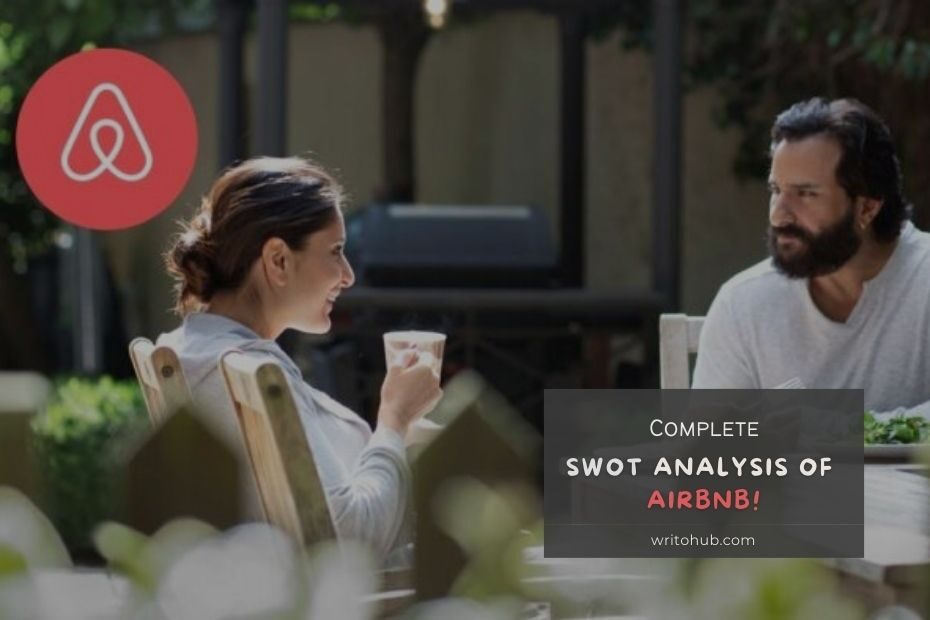Airbnb, founded in 2008, is a global online marketplace that facilitates short-term vacation rentals, homestays, and unique accommodations.
Conducting a SWOT analysis of Airbnb allows us to evaluate its internal strengths and weaknesses, as well as external opportunities and threats.
This analysis provides insights into Airbnb’s current market position and helps identify strategic areas for growth and improvement.
Strengths in the SWOT Analysis of Airbnb
- Strong Brand and Global Presence: Airbnb has established a strong brand presence globally, becoming synonymous with alternative lodging options and unique travel experiences. Its platform operates in numerous countries, allowing for a wide reach and a diverse range of listings.
- Vast Accommodation Inventory: Airbnb’s platform offers a vast inventory of accommodations, ranging from shared rooms to entire homes and unique properties. This extensive selection caters to different travel preferences and budgets, attracting a broad customer base.
- Disruptive Business Model: Airbnb’s disruptive business model has disrupted the traditional hotel industry, providing travelers with alternative and often more affordable lodging options. The platform empowers individuals to monetize their extra space and offers guests a more personalized and immersive travel experience.
- User-Friendly Technology and Interface: Airbnb’s user-friendly platform and mobile application provide a seamless booking experience for both hosts and guests. The intuitive interface, secure payment system, and review system enhance trust and facilitate convenient transactions.
- Strong Community and User Engagement: Airbnb has fostered a vibrant community of hosts and guests, enabling connections between travelers and local hosts. This community-driven approach enhances the overall Airbnb experience, encouraging user engagement, and fostering a sense of belonging.
Weaknesses in the SWOT Analysis of Airbnb
- Regulatory and Legal Challenges: Airbnb faces regulatory and legal challenges in various jurisdictions, particularly regarding compliance with local housing and zoning regulations. These challenges can restrict its operations, limit listings, and affect the user experience.
- Quality Control and Consistency: Maintaining consistent quality across all listings can be challenging for Airbnb. Hosts’ hospitality standards, cleanliness, and accuracy of listings can vary, leading to potential discrepancies and negative user experiences.
- Dependence on Hosts and Host Availability: Airbnb’s business model relies heavily on hosts listing their properties and their availability. A shortage of hosts in certain areas or their unavailability during peak seasons can limit options for guests and impact the overall user experience.
- Security and Trust Concerns: Instances of fraudulent listings, privacy breaches, or safety incidents can impact the trust and reputation of Airbnb. Ensuring the safety and security of both hosts and guests is crucial to maintaining trust in the platform.
Opportunities in the SWOT Analysis of Airbnb
- Continued Market Expansion: Airbnb has opportunities to further expand its presence in emerging markets and new travel destinations. Focusing on regions with growing tourism industries and increasing demand for alternative accommodations can drive growth.
- Experiences and Services: Airbnb’s expansion into offering unique experiences, such as guided tours, cooking classes, and local activities, presents opportunities to enhance the overall travel experience for guests. Curating and promoting these experiences can attract a wider customer base and generate additional revenue streams.
- Business Travel Segment: Targeting the business travel segment presents opportunities for Airbnb. Enhancing corporate travel partnerships, providing amenities suited for business travelers, and accommodating longer-term stays can tap into this lucrative market.
- Sustainable and Responsible Tourism: Airbnb can capitalize on the growing demand for sustainable and responsible travel by promoting eco-friendly accommodations and supporting local communities. Aligning with sustainable tourism practices can attract environmentally conscious travelers and differentiate Airbnb from competitors.
Threats in the SWOT Analysis of Airbnb
- Increasing Competition: Airbnb faces increasing competition from traditional accommodations, such as hotels and serviced apartments, as well as other online travel platforms offering similar vacation rental services. Intense competition can impact pricing, market share, and customer loyalty.
- Changing Regulations and Taxation: Changing regulations, taxes, and fees imposed on short-term rentals can pose challenges to Airbnb’s profitability and operations. Compliance with evolving legal requirements in different jurisdictions can be complex and costly.
- Reputation and Trust Issues: Negative incidents, such as unauthorized parties, property damages, or safety concerns, can harm Airbnb’s reputation and erode trust among users. Maintaining strict policies, implementing robust security measures, and addressing issues promptly is crucial to mitigate these threats.
- Economic Downturns and Travel Disruptions: Economic recessions, natural disasters, pandemics, or political unrest can significantly impact the travel industry. Reduced travel demand, cancellations, and travel restrictions can adversely affect Airbnb’s business and revenue.
Conclusion
A SWOT analysis of Airbnb highlights the company’s strengths, weaknesses, opportunities, and threats in the vacation rental industry.
Airbnb’s strong brand, vast accommodation inventory, disruptive business model, user-friendly technology, and engaged community position it well in the market.
Addressing challenges related to regulatory issues, quality control, and security is crucial for maintaining growth and trust.
Seizing opportunities in market expansion, curated experiences, business travel, and sustainable tourism can drive Airbnb’s continued success.
By proactively addressing threats from competition, changing regulations, reputation concerns, and economic disruptions, Airbnb can solidify its position as a leading global online marketplace for unique accommodations and travel experiences.
